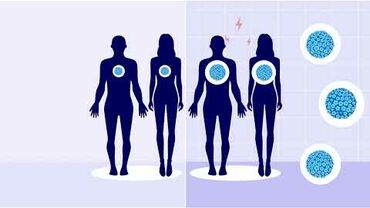Questions and answers about childhood vaccination
Below are some commonly asked questions with suggested answers that can be used to assist with conversations with patients, parents or caregivers, or made into information sheets be shared with them ahead of their visit. They have been adapted from information sheets developed by the HSE National Immunisation Office, Ireland, the Children’s Hospital of Philadelphia, US and Wellington-Dufferin-Guelph Public Health, Canada.
General
Because some children could receive as many as 25 injections by the time they are 2 years old and as many as five injections in a single visit to the doctor, many parents wonder whether it is safe to give children so many vaccines.
How do vaccines work?
Vaccines contain either a very weakened form of the virus or bacterium that causes a disease, or a small part of it. When the body detects the contents of the vaccine, its immune system will produce the antibodies required to fight off infection and eliminate the disease-causing virus or bacterium.
When a person later comes into contact with the virus or bacterium, the immune system will recognise it and protect the person by producing the right antibodies before any disease can be caused.
Are children receiving too many vaccines too soon?
No. Newborns commonly manage many challenges to their immune systems at the same time. The mother’s womb is free from bacteria and viruses, so newborns immediately face a host of different challenges to their immune systems. From the moment of birth, thousands of different bacteria start to live on the surface of the intestines. By quickly making immune responses to these bacteria, babies keep them from invading the bloodstream and causing serious diseases. In fact, babies are capable of responding to millions of different viruses and bacteria because they have billions of immunological cells circulating in their bodies. Therefore, vaccines given in the first two years of life are a drop in the ocean of what an infant’s immune system successfully encounters and manages every day.
Pre-vaccination: should my child get immunised today?
What if my child is ill?
There are very few medical reasons to delay immunisation. Babies and children with minor coughs and colds, or those on antibiotics, can be immunised safely and effectively. However, if your child has a high temperature, the immunisation should be put off until your child is better. If you are worried about whether your child is fit to be immunised, talk it over with the doctor or nurse before putting off the immunisation.
What if my child was premature, had a low birth weight or had jaundice?
In general, premature babies should be immunised as normal. It is important that premature babies are protected because they are more vulnerable to certain infections. If your child had a very low birth weight, you should discuss their immunisation needs with your paediatrician. Babies who had jaundice after being born and those who are being breast fed should be immunised as normal.
What if my child has a serious disease?
It is very important that children with serious diseases are immunised because they are often more at risk from complications of infections. Children with stable neurological conditions such as cerebral palsy or Down syndrome should be immunised as normal.
However, care is needed if the child’s illness, or its treatment, may lower their immunity. Immunisation should be carefully considered for children with cancer or an immune deficiency disorder, or who are taking medicines which may reduce their ability to fight infection. Discuss this with your doctor.
Children who have had a blood transfusion or received blood products should delay their MMR vaccination.
What if my child has asthma, eczema or hay fever?
Children with asthma, eczema, hay fever and allergies should be immunised, even if they have a severe allergy to eggs (for example, hives (red itchy bumps), swelling of the mouth or throat, difficulty breathing, wheezing, low blood pressure and shock).
Children taking steroids by inhaler or in a low-dose steroid cream should be immunised as normal. If you have any doubts, talk to the doctor or nurse giving the immunisation.
Can my child get the MMR and other vaccines if they are allergic to eggs?
The MMR vaccine can be given to children with an egg allergy. Only children that develop allergic shock when in contact with egg should avoid the MMR vaccination. Your child simply disliking eggs or having diarrhoea or stomach pains after eating eggs is not a reason to avoid it, and you do not need to take any special precautions. If you have any doubts, talk to the doctor or nurse giving the immunisation.
The flu vaccine should not be given to those who have a severe allergy to eggs.
What if my child has epilepsy or has had convulsions (fits)?
These children should still be immunised if their condition is stable. Some children get fits if they have a high temperature or a fever. If they get a high fever (over 39.5°C) after they have been vaccinated, give them paracetamol or ibuprofen. Children with a family history of fits or epilepsy should be immunised as normal.
What if my child has recently had, or is due to have, surgery?
Do not put the immunisation off if your child is due to have an operation or has recently had one. Having surgery is not a reason to put off immunisation, and a recent immunisation is not a reason to put off surgery.
What if my child has already had one of the vaccine-preventable diseases?
You should still immunise your child against these diseases, even if they have had them. It is important to be protected against all the diseases the vaccine covers, even if the child has caught one of the diseases before. This is very important as children under two years do not get enough natural immunity following illness with haemophilus influenzae, meningococcal or pneumococcal disease.
Can my child be immunised while they are in close contact with someone who is pregnant?
Yes. There is no problem with giving routine immunisations to a child who is in close contact with someone who is pregnant. In fact, immunising the child will protect the mother from being exposed to diseases like rubella.
Do some children also need other vaccines?
Yes. Children who have had their spleens removed or have cystic fibrosis, an immune deficiency, chronic heart, lung, liver or kidney disease, sickle cell disease or diseases such as diabetes are more vulnerable to some infections. If your child has any long-term illness, ask your doctor if they need to be immunised against diseases like flu or hepatitis A.
If you are travelling to another country, remember to find out if your child needs any special vaccines.
Delaying vaccination
Is it ok to delay vaccination?
No evidence to date reveals any benefits to delaying vaccines. A study in 2010 showed that children who received delayed vaccinations performed no better at ages seven to 10 on behavioural and cognitive assessments than children who received their vaccines on time. Delaying vaccines will increase the period of time during which children are at risk for vaccine-preventable diseases.
Several of these diseases, like chickenpox, pertussis (whooping cough) and pneumococcus (which causes bloodstream infections, pneumonia and meningitis) are very common and may severely affect very young children. Although the vaccine schedule can look intimidating, it is based upon the best scientific information available.
Separating, spacing out or withholding vaccines causes concern because infants will be susceptible to diseases for longer periods of time. When a child should receive a vaccine is determined by balancing when the child is at highest risk of contracting the disease and when the vaccine will generate the best immune response.
Finally, changing the vaccine schedule requires additional doctor’s visits. Research measuring cortisol, a hormone associated with stress, has determined that children do not experience more stress when receiving two injections as compared with one injection. Therefore, an increased number of visits for individual injections will mean more stressful situations for the child. In addition, there is an increased potential for administration errors, more time and travel needed for appointments, and potentially increased costs.
Autism
Some parents of children with autism are concerned that vaccines are the cause. Their concerns centre on the combination measles-mumps-rubella (MMR) vaccine and thiomersal, a mercury-containing preservative previously contained in several vaccines.
Does the MMR vaccine cause autism?
No. In 1998, a British researcher named Andrew Wakefield raised the notion that the MMR vaccine might cause autism. In the medical journal The Lancet, he reported the stories of eight children who developed autism and intestinal problems soon after receiving the MMR vaccine. To determine whether Wakefield’s suspicion was correct, researchers performed a series of studies comparing hundreds of thousands of children who had received the MMR vaccine with hundreds of thousands who had never received the vaccine. They found that the risk of autism was the same in both groups. The MMR vaccine didn’t cause autism.
Furthermore, children with autism were not more likely than other children to have bowel problems.
Does thiomersal cause autism?
No. Multiple studies have shown that thiomersal in vaccines does not cause autism. Thiomersal is a mercury-containing preservative that was used in vaccines to prevent contamination. In 1999, professional groups called for thiomersal to be removed from vaccines as a precaution. Unfortunately, the precipitous removal of thiomersal from all but some multi-dose preparations of influenza vaccine scared some parents. Clinicians were also confused by the recommendation. Since the removal of thiomersal, studies have been performed to determine whether thiomersal causes autism. Hundreds of thousands of children who received thiomersal -containing vaccines were compared to hundreds of thousands of children who received the same vaccines free of thiomersal. The results were clear: the risk of autism was the same in both groups.
Vaccine ingredients
Some parents are concerned about ingredients contained in vaccines, specifically aluminium, mercury, gelatine and antibiotics. However, parents can be reassured that ingredients in vaccines are minuscule and necessary.
Why do some vaccines contain mercury?
Mercury is contained in some multi-dose preparations of influenza vaccine as a preservative. Preservatives prevent contamination with bacteria. Early in the 20th century, most vaccines were packaged in vials that contained multiple doses. Doctors and nurses would draw up a single dose and place the vaccine back in the refrigerator. Unfortunately, sometimes bacteria would inadvertently enter the vial and cause abscesses at the site of the injection or bloodstream infections that were occasionally fatal. Preservatives, originally added in the 1930s, solved this problem.
The most common preservative used was thiomersal, a mercury-containing compound. As more vaccines were given, children received greater quantities of thiomersal. By the late 1990s, the American Academy of Paediatrics and the Public Health Service requested that mercury be removed from vaccines to make ‘safe vaccines safer’. No evidence existed to suggest that thiomersal was causing harm, but they wanted to be cautious. Unfortunately, their caution worried parents who wondered whether mercury in vaccines was causing subtle signs of mercury poisoning or autism. Addressing these concerns, scientists performed several studies, all of which showed that thiomersal at the level contained in vaccines hadn’t caused harm. Further, because mercury is a naturally occurring element found in the earth’s crust, air, soil and water, we are all exposed to it. In fact, infants who are exclusively breast fed ingest more than twice the quantity of mercury than was contained in vaccines.
Why do some vaccines contain antibiotics?
Many vaccines contain trace quantities of antibiotics or stabilisers. Antibiotics are used during the manufacture of vaccines to prevent inadvertent contamination with bacteria or fungi. Trace quantities of antibiotics are present in some vaccines. However, the antibiotics contained in vaccines (neomycin, streptomycin or polymyxin B) are not those commonly given to children. Therefore, children with allergies to antibiotics such as penicillin, amoxicillin, sulfa, or cephalosporins can still get vaccines.
Why do some vaccines contain aluminium?
Aluminium is used in vaccines as an adjuvant. Adjuvants enhance the immune response by allowing for lesser quantities of active ingredients and, in some cases, fewer doses. Adjuvants were first used in vaccines in the United States in the 1930s – specifically, aluminium salts. Some people wonder whether aluminium in vaccines is harmful. The facts are reassuring.
First, aluminium is present in our environment; the air we breathe, the water we drink and the food we eat all contain aluminium. Second, the quantity of aluminium in vaccines is small. For example, in the first six months of life, babies receive about 4 milligrams of aluminium if they get all of the recommended vaccines. However, during this same period they will ingest about 10 milligrams of aluminium if they are breast fed, 40 milligrams if they are fed regular infant formula, and up to 120 milligrams if they are fed soy-based infant formula.
Why do some vaccines contain gelatin?
Gelatin is used in some vaccines as a stabiliser. Stabilisers are added to vaccines to protect the active ingredients from degrading during manufacture, transport and storage. Gelatin, which is made from the skin or hooves of pigs, is of concern because some people (about 1 of every 2 million) might have a severe allergic reaction to it.
Also, because religious groups such as Jews, Muslims and Seventh Day Adventists follow dietary rules that prohibit pig products, some parents are concerned about using vaccines that contain gelatin. However, all religious groups have approved the use of gelatin-containing vaccines for their followers for several reasons: first, vaccines are injected, not ingested (except the rotavirus vaccine, which does not contain gelatin). Second, gelatin in vaccines has been highly purified and hydrolysed (broken down by water), so that the amount is much smaller than that found in nature. Finally, leaders from these religious groups believe that the benefits of receiving vaccines outweigh adherence to religious dietary laws.
Why do some vaccines contain formaldehyde?
Formaldehyde is used during the manufacture of some vaccines to inactivate viruses (like polio and hepatitis A viruses) or bacterial toxins (like diphtheria and tetanus toxins). While the formaldehyde is diluted during the manufacturing process, small quantities remain. Because formaldehyde is associated with the preservation of dead bodies, its presence in vaccines seems inappropriate.
However, it is important to realise that formaldehyde is also a by-product of protein and DNA synthesis, so it is commonly found in the bloodstream. The quantity of formaldehyde found in blood is ten times greater than that found in any vaccine.
Are some vaccines made using foetal cells?
Foetal cells are used to make four vaccines: rubella, chickenpox, hepatitis A and rabies. Foetal cells used to grow the vaccine viruses were isolated from two elective abortions performed in Sweden and England in the early 1960s.
Some parents wonder why scientists would choose to use foetal cells at all. There are several reasons for this. First, viruses, unlike bacteria, require cells to grow. Second, human cells are often better than animal cells at supporting the growth of human viruses.
Third, foetal cells are different from other types of cells in that they are virtually immortal, meaning they can reproduce many, many times before dying. Other cells reproduce only a limited number of times before they die.
Can the ingredients in vaccines cause allergic reactions?
In addition to gelatin, other ingredients in vaccines such as egg proteins and antibiotics might cause an allergic reaction. Because the influenza and yellow fever vaccines are grown in eggs, the final products contain sufficient quantities of egg proteins to cause an allergic reaction, albeit rarely, in people allergic to eggs.
Antibiotics are used to prevent bacterial contamination during production of some vaccines, such as neomycin, streptomycin, polymyxin B, chlortetracycline and amphotericin B. People who are allergic to any of the antibiotics used during production should consult with the doctor or nurse responsible for the immunisation before any vaccine is administered.



